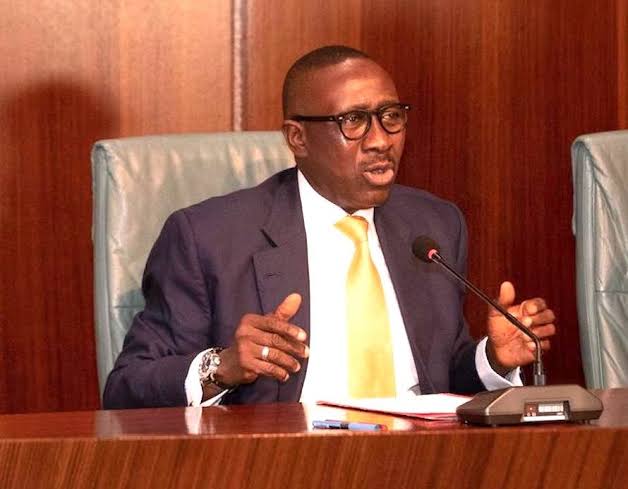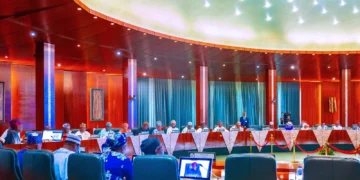In the wake of the security advisories issued by the U.S Embassy in Abuja and other diplomatic missions to their citizens, the National Security Adviser, Maj.-Gen. Babagana Monguno (retd), told State House Correspondents after an emergency National Security Council meeting convened by President Muhammadu Buhari that citizens were in no danger.
Addressing journalists along with the Minister of Foreign Affairs Geoffrey Onyema; the Chief of Defence Staff (CDS), General Lucky Irabor and the Director-General of the National Intelligence Agency (NIA), Ahmed Rufai Abubakar, Monguno said the panic which trailed the terror alert addressed to foreign citizens in Nigeria was needless as the hype and the sense of insecurity it created were unfounded. The NSA also urged Nigerians and other residents to go about their businesses without any sense of apprehension.
It is not hard to reason the standpoint of the NSA and other members of Nigeria’s defence and intelligence community, following the panic which gripped Nigerians, especially residents of the Federal Capital Territory, following the terror alert first issued by the U.S Embassy on October 23, and then amplified by other foreign missions.
While foreign missions are at liberty to issue security advisories to their citizens when they deem it necessary, many security experts seem to align with Monguno and other heads of Nigeria’s security institutions that this particular one was heavy-handed and exaggerated, and appeared to be carrying an undertone of undermining the efforts of Nigerian security agencies towards addressing the security challenges bedeviling the country.
While the media feeding frenzy coverage of the security advisories added to the level of panic they fed to the citizens, it is easy to forget how security is the job of everyone. Of course, the security agencies are tasked with keeping the country and its people safe, but in doing so, they require the cooperation and involvement of other institutions, sectors and even individuals to be able to effectively and efficiently carry out their responsibilities.
As government, vertically and horizontally, has its role to play in tackling insecurity, so do the media, organised private sector, religious and traditional leaders, politicians, foreign partners and diplomatic community, civil society organisations and citizens have their roles to play.
In almost all the security policies and strategies designed and being implemented by the Office of the National Security Adviser (ONSA), such as the National Security Strategy, National Counter-Terrorism Strategy (NACTEST), the Policy Framework and National Action Plan for Prevention and Countering Violent Extremism and the National Cybersecurity Policy and Strategy, emphases were laid on the importance of collaboration, cooperation and patriotism in the discharge of various functions which have a bearing on national security.
For instance, violent non-state armed groups – be it extremists, bandits and secessionists – often rely on media platforms to target national values and threaten national security. Terrorism and violent extremism have always been a battle for hearts and minds, and the side which controls the narrative and can efficiently counter the other’s narrative has the upper hand. To this end, the media is capable of becoming an amplifier or a disrupter of national security, depending on prevalent circumstances. Therefore, the media has always been advised to encourage responsible debates that are key to good governance as part of its contribution to national security. While democracy cannot exist without a media that is free, the media, especially editors who are gatekeepers, should ensure that the control of messaging cannot be allowed to be hijacked by common adversaries.
Also, based on a common commitment to shared values and their own moral authority, religious leaders and traditional rulers can serve as the conscience of the nation, working together to uplift and build consensus around those shared values. As custodians of faith and culture, they can bring social, moral and spiritual resources to national peacebuilding process. Part 2 of the Policy Framework and National Action Plan for Preventing and Countering Violent Extremism, explicitly defined the role of religious leaders and traditional ruler thus: “In order to prevent and counter violent extremism, faith-based organisations and leaders have a critical role to play. Through engagement, dialogue, rehabilitation and counseling, religious leaders can bring about change in behavior of violent extremists. Through their platforms, religious leaders can help vulnerable persons in finding balance and staying away from violent extremism.”
Since threats to national security have evolved and are becoming even more insidious, it is imperative for the public and private sectors to engage in effective partnership to protect people, facilities and national infrastructure assets. In modern security atmosphere, private sector partnerships are needed to mutually share information, people, processes, technologies, innovations and ideas across private sector entities such as industry, non-profit organisations, think tanks, non-governmental organisations, academic institutions, financial sector and technology institutions. One crucial way the private sector can play a part in national security is by embedding national security-value projects in their corporate social responsibility (CSR) programmes, such as youth empowerment, community development, law enforcement and infrastructure development endevours.
While it is unclear whether the U.S Embassy shared intelligence with Nigeria’s defence and intelligence community before issuing its most recent terror alert, it is important to stress that bilateral and multilateral partners have the responsibility to share intelligence with their host countries when there is the possibility of a security threat. Threat to a host country’s security will do no one any good, including foreign missions and their citizens. Thus, rather than function in isolation, synergising with the host country’s security agencies tends to be more productive than overheating the system and activating an unnecessary panic mode.
Under Monguno, ONSA has been identifying opportunities for government to partner with the media, civil society, private sector, research and academic institutions, bilateral and multilateral institutions and religious and cultural groups in the interest of national security. Perhaps, the NSA felt hard done by the kind of fright recent security advisories caused, despite commendable efforts and progress being made in tackling Nigeria’s security challenges.
– Adebiyi wrote from Abuja





